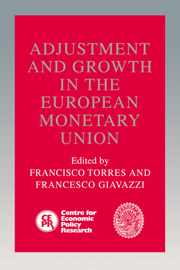Book contents
- Frontmatter
- Contents
- List of figures
- List of tables
- Preface
- List of contributors
- Foreword
- 1 Introduction
- 2 Economic and monetary union: critical notes on the Maastricht Treaty revisions
- Discussion
- 3 The design of optimal fiscal rules for Europe after 1992
- Discussion
- 4 Contracts, credibility and common knowledge: their influence on inflation convergence
- Discussion
- 5 Inflation in fixed exchange regimes: the recent Portuguese experience
- Discussion
- 6 Models of economic integration and localized growth
- Discussion
- 7 Shocking aspects of European monetary integration
- Discussion
- 8 Lessons of Massachusetts for EMU
- Discussion
- 9 Financial and currency integration in the European monetary system: the statistical record
- Discussion
- 10 Currency substitution: from the policy questions to the theory and back
- Discussion
- 11 Coordination of capital income taxes in the economic and monetary union: what needs to be done?
- Discussion
- Index
Discussion
Published online by Cambridge University Press: 29 January 2010
- Frontmatter
- Contents
- List of figures
- List of tables
- Preface
- List of contributors
- Foreword
- 1 Introduction
- 2 Economic and monetary union: critical notes on the Maastricht Treaty revisions
- Discussion
- 3 The design of optimal fiscal rules for Europe after 1992
- Discussion
- 4 Contracts, credibility and common knowledge: their influence on inflation convergence
- Discussion
- 5 Inflation in fixed exchange regimes: the recent Portuguese experience
- Discussion
- 6 Models of economic integration and localized growth
- Discussion
- 7 Shocking aspects of European monetary integration
- Discussion
- 8 Lessons of Massachusetts for EMU
- Discussion
- 9 Financial and currency integration in the European monetary system: the statistical record
- Discussion
- 10 Currency substitution: from the policy questions to the theory and back
- Discussion
- 11 Coordination of capital income taxes in the economic and monetary union: what needs to be done?
- Discussion
- Index
Summary
To begin with, let me say that I have enjoyed reading this chapter and I have learned a lot about current issues in the fiscal strand of the ‘political economy’ literature. The three fiscal policy issues surveyed in the chapter concern (i) solvency tests for government debt, (ii) the political determinants of budget deficits, both in theory and practice, and (iii) the controversy over tax smoothing versus balanced budget rules. The insights from this discussion of the literature are then combined in a critical evaluation of the fiscal convergence criteria written into the draft treaty for a European economic and monetary union (EMU). I will start my discussion of the chapter with the three issues above before commenting in more detail on the authors' principle policy recommendations and conclusions for Europe after 1992.
Section 3 of the chapter deals with the sustainability of public debt. Fiscal rules, so it is argued, may have to be enforced if fiscal policies imply unsustainable time-paths for public debt in EC member countries. Sustainability of public debt thereby implies that the present-value budget constraint of the public sector is not violated. This solvency condition is satisfied if the time series of discounted debt is covariance stationary with zero expectation.
- Type
- Chapter
- Information
- Adjustment and Growth in the European Monetary Union , pp. 83 - 92Publisher: Cambridge University PressPrint publication year: 1993



